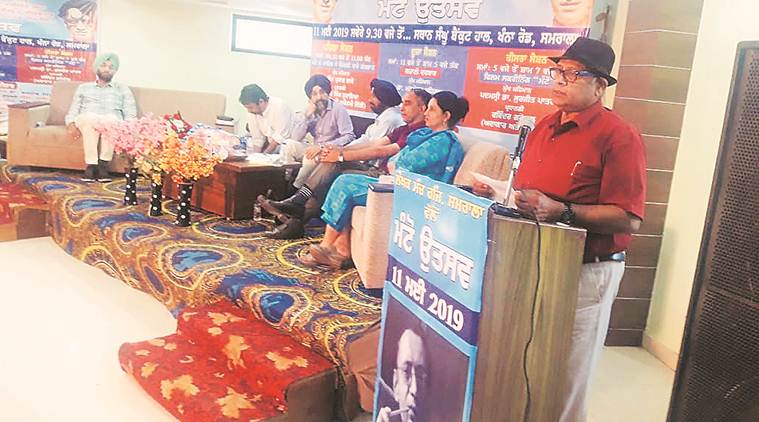
“Hindustan had become free… Pakistan had become independent soon after its inception but man was still slave in both these countries — slave of prejudice…slave of religious fanaticism… slave of barbarity and inhumanity…” wrote Saadat Hasan Manto.
The Urdu playwright and author, who extensively expressed pain and agony of Partition through his writings, shared an inseparable bond with undivided Punjab where he was born, even as he moved to Pakistan after the divide.
For the writer who belonged to both India and Pakistan and could not accept them as different two countries, it was a homecoming on Saturday, as Nandita Das’ critically acclaimed biopic ‘Manto’ was screened at his birthplace – Samrala of Ludhiana – at one-day ‘Manto Utsav’. The festival was organized by Lekhak Manch (Samrala) on his 107th birth anniversary. Apart from the film, sessions were also held discussing Manto’s lifetime, stories and thoughts. He was born on May 11, 1912.

Manto was born at his maternal village Papraudi in Ludhiana’s Samrala, where people do not have a cinema hall and mostly move to nearby towns of Khanna, Doraha or Ludhiana city to watch films.
The film had released in India on September 21 last year. On October 10, 2018, The Indian Express had reported how the author’s birthplace was left craving for Manto on screen as the film battling with distribution issues since release, did not release in Khanna or Doraha or even Ludhiana, which boasts of several multiplexes. In Ludhiana city, it has opened on just three screens with one show a day and was taken off after four days.
In Pakistan, which became Manto’s second home after the partition, the film continues to remain banned.
The film was screened at his birthplace, thanks to Daljit Shahi, president of Lekhak Manch (Samrala), which also runs ‘Saadat Hasan Manto Yaadgari Library’ at Papraudi village.
Speaking to The Sunday Express, Shahi said, “Commercial cinema has once again overpowered a critically acclaimed film. It was a misfortune of Punjab that a film on a writer who grieved for Punjab’s partition through his writings did not reach people. People in small towns do not have access to facilities like Netflix. We organized this special screening to honor Manto at his birthplace. Today was his homecoming like no other, and that too on his birth anniversary..”
Director and actor Nandita Das, in an e-mail response to questions by The Sunday Express, said, “When the film released I was sad to see that there were no screenings in Amritsar city, the place where Manto grew up, let alone in Samrala, where he was born. Through social media and some friends, I knew that they were all eagerly waiting for it. I felt angry and quite helpless as it was not in my hands. So today I am delighted that on Manto’s birthday, there is a screening in Samrala. I am very much looking forward to hearing the response from the audience.”
Speaking to The Sunday Express over phone from Lahore, Manto’s daughter Nuzhat Manto, said, “I am very happy that the film has been screened at his birthplace today. People of Pakistan are still being denied this right. I wish I could I have attended it personally but relationship between two countries is not going through best of the times and coming to India is like a dream now”.
She along with her two sisters had visited Samrala in 2012 for Manto’s centenary birth anniversary.
“If you cannot bear these stories then society is unbearable. Who am I to remove clothes of this society, which itself is naked…,” wrote Manto.
Padma Shri poet Dr Surjit Patar, chairman Punjab Arts Council, who was the key speaker today, remembering tye author said, “Manto asal vich tan dey nangej da nahi manan tey roohan dey nangej da kathaakar si… Manto vaang likhna apni qurbaani den vaang hai… (Manto’s concern was not nakedness of the bodies but that of hearts and souls… ..Writing like Manto means sacrificing oneself.)
And today, Manto returned home.